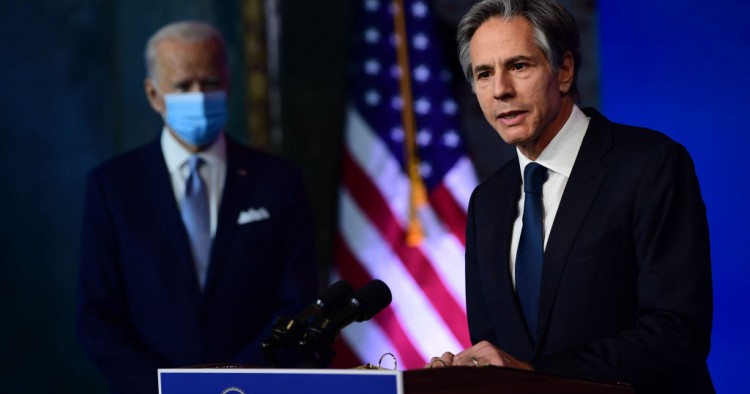The Biden Administration has a firm foundation upon which to build in Eastern Europe. As part of its focus on great power competition in the region, the Trump Administration sharply increased funding for the European Deterrence Initiative (EDI), covering costs for U.S. troops in Europe and security support for strategic allies, while repositioning some U.S. forces in Europe to the eastern flank.
Over the past year, former U.S. Secretary of State Mike Pompeo took significant steps to reinforce U.S. policy with concrete measures on the ground. Bilateral memorandums of understanding on 5G and energy cooperation were followed by two of the region’s largest bilateral economic deals to date, totaling over $26 billion. Romania signing a deal worth $8 billion for the development of its nuclear power plant, followed days later by Poland’s first nuclear power plant announcement worth $18 billion. The U.S. also offered a contribution of up to $1 billion for the Three Seas Initiative, focused on critical infrastructure development in Eastern Europe. To maintain momentum, this administration must act to ensure our continued presence in Eastern Europe and ongoing support to our increasingly threatened strategic allies.
The West’s response to Russia’s 2014 occupation and annexation of Crimea has long been perceived as insufficient, especially in the Black Sea region. Following the 2016 NATO Warsaw summit, a significant military force was deployed in the Baltic Sea states to deter Russia. However, the southern front of the Alliance’s eastern flank, where Russia has created a series of frozen conflicts and carried out invasions in both 2008 and 2014, remains challenged. Russia’s blockade of the Sea of Azov in 2018 has also been met with limited response. The West must do more to deter Russia’s increasingly aggressive Anti-Access/Area Denial efforts in the Black Sea.
President Donald Trump’s focus on great power competition in Eastern Europe came with a significant increase in support for both the Baltic and Black Sea regions. Funding for the Obama-era EDI increased dramatically, rising from $1 billion per year in 2015 to $6.9 billion in 2020. Although U.S. support has continued to be more heavily in favor of the Baltic Sea states — the region received some urgently needed support to contain both Russia and China.
In response to the threat of Russia, the Trump Administration began delivering lethal weapons to Georgia and Ukraine and increased U.S. military aid to the region. On China, Secretary Pompeo secured cooperation on 5G and intervened to prevent Chinese acquisitions of critical infrastructure in Ukraine, Romania, and Bulgaria. Having consistently pleaded for greater Western presence on the Black Sea since Russia’s invasion of Georgia in 2008, Romania recently become the host of a third U.S. military base on its territory. Bucharest also strengthened its strategic partnership with Washington with the signing of a 2030 roadmap for defense cooperation.
The Trump Administration undertook vital, and arguably overdue, steps to support its key allies in the Black Sea, one of the world’s most volatile security environments. The Biden Administration will need to do more. The Black Sea’s insecurity is increasing by the day and U.S. allies rely on Washington to lead and offer their democracies the support and protection they need. Russia’s intervention in Syria has added to the region’s insecurity, enabling illegal migration flows since 2015. Six years after its onset, the war in Eastern Ukraine continues unabated. The second Nagorno-Karabakh war created even greater instability. New borders have been decided while the West watches. Georgia continues to be confronted with Russian “borderization” activities in the north and the recent deployment of 2,000 Russian troops to Nagorno-Karabakh in the south.
The Biden Administration is taking shape with a promising team on Eastern Europe. Just as insecurity in the Black Sea increases by the day, the new administration will need to act quickly to step up U.S. presence and support for its allies in the region. President Biden is well versed on Ukraine; the policies he prioritized during the Obama Administration focused on the fight against corruption, now they must also focus on concrete security measures to contain Russia and China in Eastern Europe. To further deter Russian aggression and increased Chinese activity in the region, the Black Sea needs three things from the U.S.: strategic leadership, continued military support, and focused infrastructure development. Military engagement with Ukraine and Georgia is critical. We must consider a more consistent naval presence, as well as more military engagement and aid for U.S. allies that are making economic sacrifices to ensure Western security. Economically, the region needs help developing alternative energy resources allowing them to move away from dependence on Russia.
We have made important steps to support our strategic allies in Eastern Europe, but this administration needs to stay the course and increase its focus and commitment to the Black Sea region. Russia must understand the costs of their adventurism in order to prevent further reckless behavior.
Gen. (Ret.) Philip Breedlove is Distinguished Chair of MEI’s Frontier Europe Initiative. Iulia Joja is a Senior Fellow with MEI’s Frontier Europe Initiative. The views expressed here are their own.
Photo by Mark Makela/Getty Images
The Middle East Institute (MEI) is an independent, non-partisan, non-for-profit, educational organization. It does not engage in advocacy and its scholars’ opinions are their own. MEI welcomes financial donations, but retains sole editorial control over its work and its publications reflect only the authors’ views. For a listing of MEI donors, please click here.













